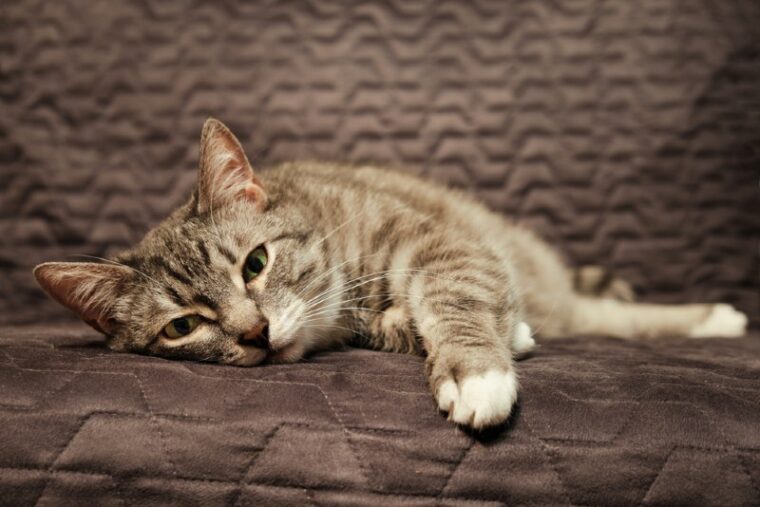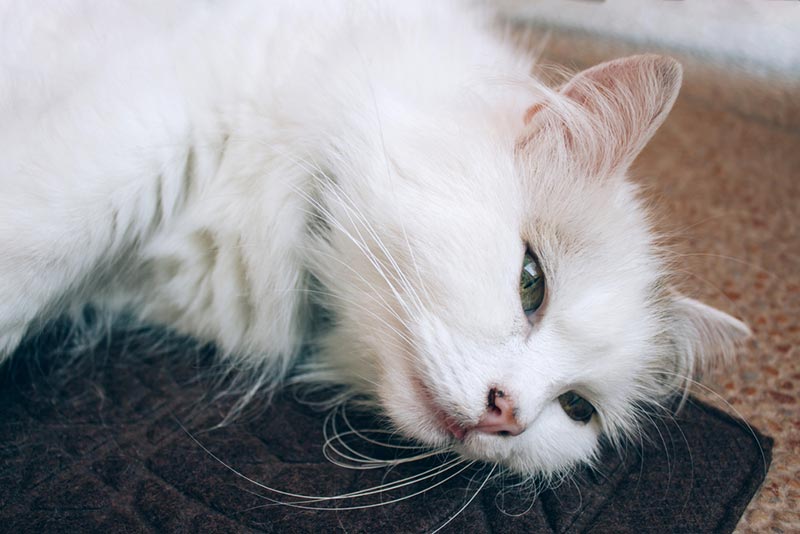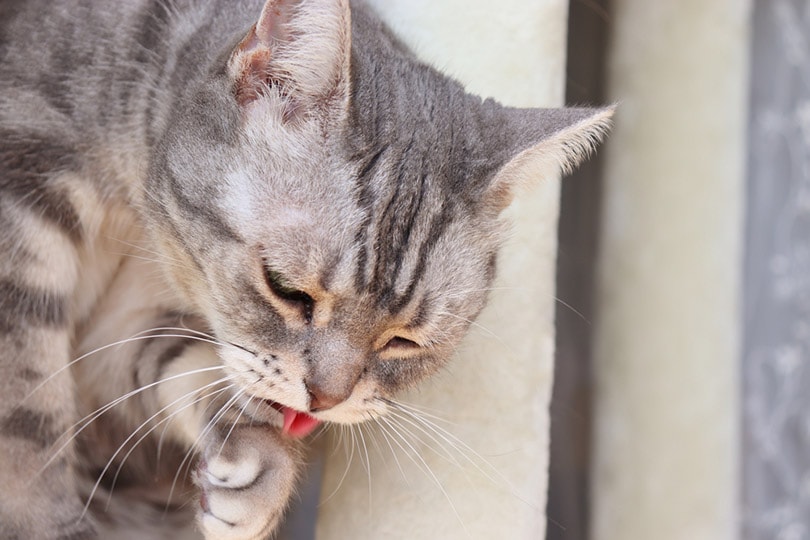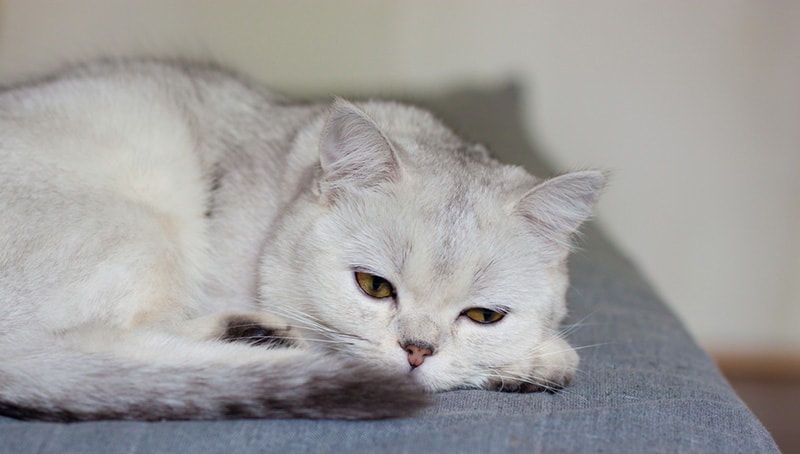
Click to Skip Ahead
Acid reflux is another term used to describe what us humans may recognize as heartburn. Acid reflux occurs when the acidic stomach juice backs up, and/or splashes up into the esophagus. The esophagus is the tube of soft tissue and smooth muscle that takes food from the mouth into the stomach. This acid is extremely irritating as it is normally used to help break down and digest foods. It is normally contained within the stomach, where the stomach lining is able to withstand its acidity. However, once it comes into contact with the esophagus, especially if it is a chronic issue, the esophagus will become irritated, painful, and your cat may start to act and feel ill. Acid reflux can occur for a number of reasons and may be difficult to recognize. The good news is that it can be treated and your cat can find relief.
What Is Acid Reflux in Cats?
In a healthy, normal patient, the stomach constantly produces an acidic liquid to help break down and digest food. This acid is normally contained within the stomach, which can tolerate its low pH. However, when some of the acid backs up into the esophagus, this is referred to as acid reflux.
Gastroesophageal Reflux Disease, abbreviated GERD, is the chronic condition of acid reflux. “Gastro” or “gastric” refers to the stomach. The esophagus is the connection of the mouth to the stomach that helps to transport food and liquids to be digested. Gastroesophageal therefore refers to the esophagus, the stomach, and its connection. Over time, the acidity of this stomach liquid will irritate and damage the lining of the esophagus. The lining of the stomach is not meant to tolerate contact with this acid as the stomach is. This may cause severe pain, swelling, and even scarring of the esophagus at the irritated areas.

What Are the Signs of Acid Reflux & Indigestion in Cats?
GERD may be difficult to diagnose. Unfortunately, cats cannot tell us they have “heartburn”, so as veterinarians and cat owners, we may need to discern the abnormal signs.
You may notice your cat having difficulty swallowing. This may look different in different cats. Your cat may drop food out of their mouth when they go to swallow, have an exaggerated swallowing or gagging motion, or only be able to swallow water or liquid food. Your cat may even tip their head back to try and swallow food, or gag or cough out food as they try and swallow due to the pain and inflammation.
Regurgitation is extremely common with GERD. This is when your cat opens their mouth and liquid and/or food comes out. There is not an abdominal “heaving” component as with vomiting. Vomiting is when the stomach and sometimes upper intestinal contents are expelled out of the body. However, with regurgitation, the liquid and/or food is often coming from the esophagus as it never made it to the stomach. Other times the stomach is not contracting to expel the contents and therefore they are just regurgitated outwards.
Your cat may walk up to food and water as if hungry, but then walk away. This may be because GERD can be very painful. And while your cat is hungry and/or thirsty, they are in so much pain they can’t bring themselves to eat or drink. Other times you may notice your cat drooling, gagging, or being completely anorexic.
What Are the Causes of Acid Reflux in Cats?
GERD is often secondary to something else, and is not typically the primary disease. If your cat tends to eat things they shouldn’t, including plants and/or human foods, this may upset their stomach and cause acid reflux. If your cat is on a high fat, high protein diet, this may cause increased stomach acid production and be a catalyst for GERD.
IBD, or inflammatory bowel disease, is a common cause of stomach and intestinal inflammation in cats. This may then lead to acid reflux over time. Unfortunately, there has been a link to cats developing intestinal lymphoma, a type of cancer, if they suffer from IBD for a prolonged period of time.
Other times cats can develop acid reflux and secondary GI signs from diseases that have nothing to do with the intestinal tract. Cats will often develop nausea, anorexia, and vomiting when they have kidney disease, diabetes, hyperthyroidism, and parasites. With any of these conditions, cats can also suffer from chronic pancreatitis. All of these diseases may predispose a cat to develop acid reflux and eventually GERD.
There are certain medications that can cause irritation to the stomach in cats. Cats have also been shown to develop scarring of the esophagus secondary to receiving some medications. These medications can irritate the lining of the esophagus and/or stomach, causing scar tissue to form. This may then cause a cat to develop acid reflux.

How Do I Care for a Cat With Acid Reflux or GERD?
Your veterinarian will likely have you put your cat on a lower fat diet. This may help to reduce stomach acid production. Depending on how severe your cats’ GERD is, your veterinarian may also only have you feed canned food or softened kibble. Oftentimes cats are fed small meals at a time so as not to overwhelm their stomach.
Antacids are often prescribed to help reduce acid reflux and its subsequent irritation of the esophagus. In addition, a medication called sucralfate is often used as well. This medication helps to coat the lining of the esophagus to help protect it from excessive stomach acid backing up and causing irritation.
In addition to antacids and sucralfate, pro-motility medications are often used with GERD. These help to tighten the closure (or sphincter) of the entrance of the stomach from the esophagus (called the lower esophageal sphincter). Some medications may also help to increase motility of food and liquids through the esophagus and stomach to reduce transport and digestion time.
If your cat has GERD secondary to another disease – such as pancreatitis, IBD, renal failure, cancer, diabetes, etc. – these diseases will also need to be managed. Your veterinarian will need to treat not only the GERD, but also the underlying disease(s) that may be the cause of the irritation in the first place.

Frequently Asked Questions (FAQs)
How is GERD diagnosed?
A thorough history is key in helping your veterinarian determine if your cat is suffering from GERD. Determining if your cat is regurgitating vs. vomiting , any medications, prior anesthetic events, etc., may all help guide your veterinarian’s diagnostic plan. While x-rays and ultrasound may help, an endoscopy is the gold standard diagnostic tool. This is when a small camera is placed into the mouth, and it travels down the esophagus and into the stomach. Visualizing the esophageal and stomach lining, as well as watching contractions of both of these, help to accurately diagnose GERD.
Can GERD be cured?
Yes. GERD is a treatable disease. If the damage to the esophageal lining can heal and normalize, and the reflux can be controlled, your cat may not suffer from this condition lifelong. However, keep in mind that GERD is often secondary to another disease. That underlying disease may not be curable. In which case, GERD may recur in the future, even if treated successfully once.
Conclusion
Chronic acid reflux in cats, abbreviated GERD, is a condition often secondary to another underlying disease. It’s caused by the chronic backflow of stomach acid up into the esophagus, over time causing severe irritation, swelling, pain, and sometimes scarring. It can be difficult to diagnose as cats are unable to tell us that they have heartburn-like symptoms. GERD is treatable and your cat can be cured from it. However, the underlying disease(s) that caused the acid reflux in the first place may be a lifelong disease that your cat will always have. If this is the case, your cat may suffer from GERD multiple times in their life.
Featured Image Credit: Zhuravlev Andrey, Shutterstock







